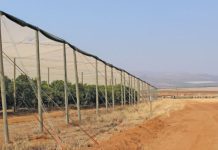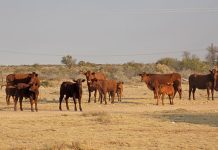I used to be involved in agricultural and forestry development in the former homeland areas of the Eastern Cape, where I facilitated and managed various projects. One of the greatest problems we encountered was access to supplies and materials. I often wished for a BKB-type farmer’s co-op, a one-stop farmers shop, as I wasted a lot of time and fuel in search of basic inputs, either for a project or for labour. It was on one of those frustrating days that I discovered an Farmers’ Corp branch.
We were working on a forestry project just outside Keiskammahoek and anyone who has been there will know it’s no metropolis. I arrived on site early one Saturday morning, only to be promptly informed by my workers that I had forgotten mealie meal, Boxer tobacco, angle iron and fencing.
Actually, I hadn’t forgotten – the foreman had simply not mentioned it in our telephone conversation earlier that morning. I had been set up. ”No food no work,” was the workers’ attitude. We were under production pressure and had to push through the weekend, but what would I find open in Keiskammahoek on a Saturday morning? Angered, I headed for Keiskammahoek.
A nice surprise After a quick analysis I realised most of the stores traded in liquid refreshment, but I kept searching. Suddenly, a huge yellow sign appeared, which read “Umtiza Farmer’s Corp”. It was a rural project manager’s dream. I was hastily and professionally served, and within minutes I was back on the road. Since then, I’ve made a point of using the Umtiza branches in Butterworth and Peddie and in any other Eastern Cape town where I can find one.
The service has always been the same, and they have always been well-stocked. Not only is Umtiza a well-run outfit, but it’s also growing steadily. It carries a stockholding in excess of R6 million and should turn over about R50 million this financial year. ”Over the past 14 years we have been profitable every year,” says Doug du Preez, a managing director of Umtiza.
Umtiza is headed by four directors, Alan Pietrucci, du Preez, Dumisani Fadana and Fezeka Mkile. Major shareholders include the Amathole Farmers’ Association and the OR Tambo Farmers’ Association. Building up agriculture T he company is involved in agricultural development focused on emerging farmers and is highly successful – something not often seen in the former homelands. Government seems to pursue the route of mass agricultural development, with programmes such as the Massive Food Production Programme in this area.
Their focus is on community projects in which hundreds of people have vested interests. Large sums of money are pumped into projects with very little or marginal profitability. Umtiza is about taking the individual and providing him or her with the tools, infrastructure and skills to become commercially viable. Much of Umtiza’s success lies in the practical amalgamation of traditional African-style agriculture with commercial farming principles.
It achieves this by combining what is agriculturally available in the former homelands with organised support structures. Umtiza focuses on what can be done, expressed through the various services and products it offers, which includes: stocking most veterinary requirements, balanced and raw feeds, in-house advice and training, branches through which to arrange the purchase and sale of livestock, markets to sell produce and in-house access to tractors, ploughs and ploughing services. Further, as they have access to financial services, farmers can even grow crops for Umtiza.
Most noteworthy are the back-up support and training services they offer. Testament to this is Lungile Monakali of the Mthimkhulu farm near Kidd’s beach.
He is both a farmer and a shareholder in Umtiza, and started farming in 2005 with 2ha of maize. Today he has 120ha planted to maize. “I could not have achieved this without Umtiza, they saw me through my entire first crop of maize, from beginning to end,” says Monakali. Since 2005, Umtiza has monitored Monakali’s crop on a monthly basis and given him advice on programmes such as fertilisation and pest control, to guarantee maximum output. Ongoing initiatives Umtiza’s training department hosts monthly training days.
These training days cement Umtiza’s existence in the former homelands, as they provide the opportunity to build personal relationships with producers and shareholders, which results in mutual trust. This trust forms the backbone of successful farming ventures, where local farmers’ suspicion of so-called commercial ventures verges on paranoia.
Umtiza has a good, long-standing relationship with the agricultural department and facilitates and manages some of its agricultural projects. It’s a government and municipally registered supplier of all agricultural products and supplies. However, one cannot help but feel that it would be in the department’s best interest to forge an ever better relationship with the company, as it already has the necessary infrastructure and expertise in place. So, here government’s concept of a “public private partnership” would guarantee results.
With adequate backing, Umtiza would be able to fast-track its own growth and future effectiveness. This will benefit existing farmers and create an environment where new farmers can be introduced into the sector. This could greatly increase the number of successful emerging and commercial farmers, and give them the opportunity to compete more competitively. Contact Umtiza Farmers’ Corp on (043) 722 4215 or e-mail [email protected] or visit www.umtiza.co.za. |fw
The business plan
Umtiza is based in the Eastern Cape and was started in 1993. Its first outlet was located at the fresh produce market in East London. At that stage it was more of a store trading in rice, beans and maize. With the arrival of the new South Africa, the former Transkei and Ciskei agricultural co-ops disappeared. By 1997 Umtiza had outlets in East London, King William’s Town and Peddie. And there has been a significant change in the type of stock the outlets carried – 85% of which is agricultural stock. There are now 11 branches of Umtiza situated in Alice, Butterworth, Idutywa, East London, Fort Beaufort, Keiskammahoek, King William’s Town, Mthatha, Peddie, Stutterheim and Tsomo.
They operate along the lines of traditional farmer’s co-ops, and also make agricultural input and maintenance products available. The group realised its future growth depended on presenting farmers, whether commercial or emerging, with the opportunity of becoming equity participants. So, the business was converted from a privately owned close corporation to a publicly unlisted company in 2003, and it became Umtiza Farmers’ Corp Limited.
Since then, nearly 4 500 farmers have acquired shares in Umtiza. Shareholders are primarily commercial and emerging farmers, small-scale stock owners, and crop growers. There are also plans to extend to Engobo, Lusikisiki, Flagstaff and Bizana. Umtiza plans to open community owned subsidiary branches or satellite branches in rural districts. The initial target was to have a minimum of 50,1% of Umtiza owned by PDIs (Participative Development Initiative) and local farmers. Shares are currently trading at R150.
Working staff
The individual branches are each managed by a team of competent staff, headed by a branch manager with a degree or diploma in agriculture or a minimum of 10 years practical farming experience and extensive in-house training. Assistant managers possess similar skills and experience.
However, with the shortage of skilled agriculturists in the area, third-year students have been given internships. Each branch is fully computerised and administered centrally from East London.








